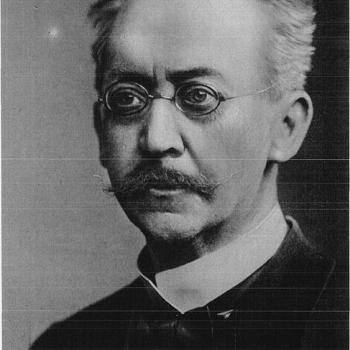This article came about as a result of dialogues on atheist Jonathan MS Pearce’s blog, A Tippling Philosopher. Words of atheist Geoff Benson will be in blue; those of atheist eric in green, and Jonathan MS Pearce‘s in purple.
*****
On the odd occasions I venture to religious Patheos I never fail to be surprised by how little comment they generate.
I’ve explained this several times. We’re preaching to the choir in large part and so our followers agree with what we write.
With atheists, on the other hand, they feel themselves put-upon and persecuted by the larger Christian culture (except maybe not in the extremely post-Christian UK) and so they love to get together and bolster each other’s confidence, by (largely) mocking, insulting, and caricaturing Christians and Christianity and the Bible, so as to rationalize their own disbelief.
This generates tons of comments, whereas no Christian site can be found with an analogous obsession with pummeling atheists. We’re more busy getting on with our lives.
Moreover, we readily see here and in other atheist sites that it is relatively few folks commenting over and over and over and over and over and over and over and over and over and over and over and over and over and over and over and over and over again.
So you might have four obsessed atheists making fifty comments each in a thread (that’s already 200 in short order) and a few brave theists going back-and-forth with ’em, for another 150-200 (mostly short, tweet-like utterances) and you’re quickly up to 400, but what does this prove? The truth of atheism? Hardly. It proves that these four people have nothing better to do than to mock and caricature a Supreme Being that they don’t even believe exists.
It’s true obsession and the True Believer syndrome. And it’s mostly an echo chamber and an impervious bubble.
Bert [Bigelow]‘s scorecard shows we could pretty much all do with a bit more focus on content posts and fewer snipes. However if you think the traffic difference is merely a ‘squeaky wheel’ effect of few but greater posting nonbelievers, rather than than an actual difference in what on-line folks are interested in discussing, then I think you’re engaging in a bit of wishful thinking. There’s been a roughly 12-point drop in the last 10 years in USAians who self-identify as Christian, and a corresponding growth in Nones. And young people are on line much more than older people. You don’t think the traffic trends such as the one on Patheos might be related to this very real trend? That it’s just an echo chamber effect not related to the number of real young people turning from religious to nonreligious thought? I would argue that places like here, right here, and places like your site, are where you’re losing the next generation. That traffic differences in places such as Patheos are at the very least a trailing indicator of that real trend, if not a leading cause.
Absolutely. That’s what I didn’t mention: the growth of atheism. That means lots of “young Turks” coming on like gangbusters, full of zeal and fury alike. I spoke generally. There are other factors as well. This is one of them.
Just for the record, my blog at the Catholic channel [at Patheos, the same host as Jonathan’s blog] either gets the most traffic or is near the top and has been for over six years. Also, comments don’t count as pageviews, as I understand it.
So it’s not exactly my blog that is on the leading edge of driving people into atheism. In fact, there are several hundred documented cases of folks crediting my writing for their becoming Catholics or returning to the Church.
Secularism has been growing and expanding since WWII and really took off after the Sexual Revolution. What we see today is no surprise at all. I’ve been saying for years that the US is ten years behind the secularism in Canada and 20 behind the UK. It has all come to pass. We’ll have hell to pay in the long run as a result. Western Civilization is an increasingly unpleasant place to be.
Fun fact: the nonreligious channel produces over half of the traffic to the entire Patheos site.
Exactly: for the reasons I gave. Traffic is not the end-all of significance. Thinking it is is just the ad populum fallacy, and you know better than that. Me, I prefer substantive content and quality to mostly insults and caricatures and quantity.
Porn sites no doubt have exponentially more traffic than atheist sites. Does it follow that they are better or more worthwhile or important? Of course not.
Now you’re shifting the goal posts. Your original claim was that the higher traffic on JP’s site was due to (I’ll quote you): “it is relatively few folks commenting over and over and over and over and over and over and over and over and over and over and over and over and over and over and over and over and over again.” What I’ve pointed out is that this is probably not true. Your statement is not true.
Why: because we have statistical trend data to indicate that there is a real shift in the number of USAians expressing None-type ideology vs. traditional Catholic or Protestant theology, and this data shows that the shift is occurring predominantly in the young. Given that young people tend to be more on-line, it seems very reasonable to conclude from our statistical information that the observed predominance of None-type talk over traditional theological talk on places such as Patheos is driven by an actual predominance of None-type viewers over traditional theological viewers amongst the real posters who visit and post on Patheos. Your lower traffic is not due to JP getting ‘four people who post 50 comments each’, it’s due to a higher number of individual visitors – actual people – who would rather read JP’s stuff than yours.
I have no idea whether the traffic on porn sites is due to a few many-repeat visitors or a broader base that visits them less frequently. I’ll take a SWAG and say I bet the distribution follows the power law. But I do know that when someone starts a conversation talking about whether traffic is generated by a few individuals vs. many, and ends by saying they were discussing post quality not quantity of visitors, that that is a goalpost shift.
Well said. And you are right in linking it to trend data and demographic shifts. AFAICT all the Patheos traffic data shows this. Patheos know this too, which presents a dilemma, because they both need us and hate what we say!
Nonsense. I first made a generalized statement about actual commenter behavior (which was backed up, incidentally, by the recent criticisms of site co-operator Bert Bigelow). Then when the phenomenon of growing atheism was mentioned, I readily agreed, saying, “Absolutely. That’s what I didn’t mention: the growth of atheism. . . . I spoke generally. There are other factors as well. This is one of them.”
One generalization doesn’t rule out others, as if there is but one cause for any given state of affairs, or as if my saying the second thing (agreeing with you) contradicts my original observation. So your comment is fundamentally silly. No one is more aware of multiple causation than a sociology major, as I was. We see the results of secularism all around us in the US. My family sees it in our children’s friends: ostensibly Catholic or Protestant, but becoming obviously more secularized and leftist and sexually liberal all the time. It’s happening right before our eyes. I’m the last one to deny that.
Clearly, a rise in atheists will lead to more traffic on atheist sites. DUH! But one must also make a deeper analysis. What we see online is not representative of entire communities, whether we are talking about Christians or atheists. It’s a small sub-sector. Atheists online tend to be of the anti-theist variety: always running down Christianity and Christians and the Bible.
But atheists in real life are quite different (broadly speaking). They’re not as obsessed with Christianity. I know this, too, having been with many of them in person, in their homes (and my home), in extensive dialogue. So I can talk about online atheist behavior, while knowing full well that it doesn’t represent atheists across the board. The same is true of unsavory Christian expression online as well.
People behave very differently online, compared to in person.
*
It’s no coincidence that countries recording the highest levels of contentment and happiness are also the most secular. The US is at a strange, I think transitional, stage at the moment where it understands the enlightened world of reason and rationality, but somehow is unable to shake off the yoke of religious belief. I know you are diametrically opposed to this view, but I think I’m seeing it for what it is.
I found an article from a site called Philanthropy Roundtable, entitled, “Less God, Less Giving?: Religion and generosity feed each other in fascinating ways” (Karl Zinsmeister, Winter 2019). I shall cite it at length (because there is so much great and relevant information in this article):
When researchers document how people spend their hours and their money, religious Americans look very different from others. Pew Research Center investigators examined the behavior of a large sample of the public across a typical seven-day period. They found that among Americans who attend services weekly and pray daily, 45 percent had done volunteer work during the previous week. Among all other Americans, only 27 percent had volunteered somewhere. (See graph 7)
The capacity of religion to motivate pro-social behavior goes way beyond volunteering. Religious people are more involved in community groups. They have stronger links with their neighbors. They are more engaged with their own families. Pew has found that among Americans who attend worship weekly and pray daily, about half gather with extended family members at least once a month. For the rest of our population, it’s 30 percent. (See graph 8)
Of all the “associational” activity that takes place in the U.S., almost half is church-related, according to Harvard sociologist Robert Putnam. “As a whole,” notes Tim Keller, “secularism is not good for society.” Secularism “makes people very fragmented—they might talk about community, but they aren’t sacrificing their own personal goals for community, as religion requires you to do.”
Religious practice links us in webs of mutual knowledge, responsibility, and support like no other influence. Seven out of ten weekly church attenders told Pew they consider “work to help the needy” an “essential part” of their faith. Most of them put their money and time where their mouth is: 65 percent of weekly church attenders were found to have donated either volunteer hours or money or goods to the poor within the previous week. (See graph 9)
Philanthropic studies show that people with a religious affiliation give away several times as much every year as other Americans. Research by the Lilly School at Indiana University found Americans with any religious affiliation made average annual charitable donations of $1,590, versus $695 for those with no religious affiliation. Another report using data from the Panel Study for Income Dynamics juxtaposed Americans who do not attend religious services with those who attend worship at least twice a month, and made fine-tunings to compare demographic apples to apples. The results: $2,935 of annual charitable giving for the church attenders, versus $704 for the non-attenders. (See graph 10) In addition to giving larger amounts, the religious give more often—making gifts about half again as frequently.
In study after study, religious practice is the behavioral variable with the strongest and most consistent association with generous giving. And people with religious motivations don’t give just to faith-based causes—they are also much likelier to give to secular causes than the nonreligious. Two thirds of people who worship at least twice a month give to secular causes, compared to less than half of non-attenders, and the average secular gift by a church attender is 20 percent bigger. (See graph 11) . . .
America’s tradition of voluntary charitable giving is one of the clearest markers of U.S. exceptionalism. As a fraction of our income, we donate over two and a half times as much as Britons do, more than eight times as much as the Germans, and at 12 times the rate of the Japanese. . . .
Other research shows that of America’s top 50 charities, 40 percent are faith-based.
An even more inclusive 2016 study by Georgetown University economist Brian Grim calculated the economic value of all U.S. religious activity. Its midrange estimate was that religion annually contributes $1.2 trillion of socioeconomic value to the U.S. economy. This estimate includes not only the fair market value of activity connected to churches (like $91 billion of religious schooling and daycare), and by non-church religious institutions (faith-based charities, hospitals, and colleges), but also activity by faith-related commercial organizations. That $1.2 trillion is more than the combined revenue of America’s ten biggest tech giants. It is bigger than the total economy of all but 14 entire nations. . . .
[M]embers of U.S. churches and synagogues send four and a half times as much money overseas to needy people every year as the Gates Foundation does! . . .
Over the last couple decades, soaring interest in the poorest of the poor by evangelical Christians in particular has made overseas giving the fastest growing corner of American charity. One result: U.S. voluntary giving to the overseas poor now totals $44 billion annually—far more than the $33 billion of official aid distributed by the U.S. government.
There are many other types of charity and social healing where religious givers are dominant influences.
- Religious Americans adopt children at two and a half times the overall national rate, and they play a particularly large role in fostering and adopting troubled and hard-to-place kids. (See graph 13)
- Local church congregations, aided by umbrella groups like Catholic Charities, provide most of the day-to-day help that resettles refugees and asylum seekers arriving in the U.S.
- Research shows that the bulk of volunteers mentoring prisoners and their families, both while they are incarcerated and after they are released, are Christians eager to welcome offenders back into society, help them succeed, and head off returns to crime. . . .
- Faith-based organizations are at the forefront of both care and recovery for the homeless. A 2017 study found that 58 percent of the emergency shelter beds in 11 surveyed cities are maintained by religious providers—who also delivered many of the addiction, health-care, education, and job services needed to help the homeless regain their independence. (See graph 16)
- Local congregations provide 130,000 alcohol-recovery programs.
- Local congregations provide 120,000 programs that assist the unemployed.
- Local congregations provide 26,000 programs to help people living with HIV/AIDS—one ministry for every 46 people infected with the virus.
- Churches recruit a large portion of the volunteers needed to operate organizations like Habitat for Humanity, Meals on Wheels, America’s thousands of food pantries and feeding programs, Big Brothers Big Sisters, the Red Cross, and other volunteer-dependent charities. . . .
It isn’t just a matter of serving and healing others. People of faith also behave differently themselves. There is lots of evidence that in addition to encouraging a “brother’s keeper” attitude that manifests itself in philanthropy and volunteering, religious participation also inculcates healthy habits that help individuals resist destructive personal behavior themselves.
A classic study by Harvard economist James Freeman found that black males living in inner-city poverty tracts were far less likely to engage in crime and drug use if they attended church. Church attendance was also associated with better academic performance and more success in holding jobs. Follow-up studies found that regular church attendance could even help counterbalance threats to child success like parental absence, low school quality, local drug traffic, and crime in the neighborhood.
Regular religious participation is correlated with many positive social outcomes: less poverty, fewer divorces and more marital happiness, fewer births out of wedlock, less suicide, reduced binge-drinking, less depression, better relationships. This is true among Americans of all demographic backgrounds.
Given all the evidence linking religious practice with both healthy individual behavior and generosity toward others, recent patterns of religious decline are concerning. . . .
It’s clear that America’s unusual religiosity and extraordinary generosity are closely linked. As faith spirals downward, voluntary giving is very likely to follow.
I’m suspicious of this study. Basically there’s a Templeton connection with one of the Board members, and Templeton connections never end well. You’ll criticise me for being so readily dismissive (probably rightly!) but I’m always suspicious of these sorts of study which, I think, run contrary to reality.
Of course this is the one that says Christians do more good stuff.
*
The link is clear, and sociology (my major in college) confirms it. It’s not just Christians saying we are better than others (circular argumentation). And to the extent we are better, in the Christian view it is all ultimately God‘s doing. God’s grace and enabling power transform our lives and make us capable of doing good and righteous and loving, charitable things. We merely cooperate with that grace. This is the teaching of Catholicism, Orthodoxy, and historic Protestantism alike: human beings (including atheists) can literally do no good thing without the enabling power of God’s grace.
But the above information from social science clearly shows that if we want a better society, we will encourage religion, not discourage it. If we want a less caring, more heartless, less charitable, less other-directed society, we will encourage atheism and neglect of church attendance. That’s not my subjective, biased opinion as a Christian; it’s the objective data of sociology. Of course, I would have predicted precisely this, and the secular science backs up what Christianity has said all along: that God (i.e., when we actually cooperate with Him and let Him be the primary purpose of our lives) produces better, more loving and caring human beings on the whole.
See also:
Secularization: Thoughts on its Many Historical Causes [9-13-03; rev. 1-20-04]
Is America a “Moral Sewer” (Due to Secularism)? [9-5-15]
Sociology: Absence of Mother or Father Harms Children [6-23-16]
Christian Civilization Self-Demolition [8-5-16]
Debate: Do Liberal Social Policies Lessen Abortion & Poverty? [4-12-17]
Gun Control & Deep-Rooted Societal Causes of Massacres [10-5-17]
Social Science: Religion Leads to Lower Suicide Rates [6-9-18]
Seidensticker Folly #1: Atheist vs. Christian Generosity [8-12-18]
Sexual Revolution: Not “Liberation” But Societal Tragedy [9-6-19]
Sociology: Devout Married Christians Have Best Sex [2-29-20]
Sociology: Undeniably, Religion Makes Us Better Human Beings [5-10-21]
It depends on what one means by “happiness” also. The UN puts out a “World Happiness Report.” According to that, here are the happiest countries (note that they are overwhelmingly first world / western countries):
- Finland
2. Denmark
3. Switzerland
4. Iceland
5. Norway
6. Netherlands
7. Sweden
8. New Zealand
9. Austria
10. Luxembourg
11. Canada
12. Australia
13. United Kingdom
14. Israel
15. Costa Rica
16. Ireland
17. Germany
18. United States
19. Czech Republic
20. Belgium
It looks to me like it basically boils down to the richest countries producing happier people. This is the myth that money supposedly makes one happy more than any other factor. If you believe that, I have some oceanfront property in Kansas to sell you. Hence, we see a lot of overlap between this list and a listing of the highest median income in nations:
1) Luxembourg – 26,321
2) United Arab Emirates – 24,292
3) Norway – 22,684
4) Switzerland – 21,490
5) United States – 19,306
6) Canada – 18,652
7) Austria – 18,405
8) Sweden – 17,625
9) Denmark – 17,432
10) Netherlands – 17,154
No I don’t think that’s the correlation necessarily, except insofar as poverty leads to unhappiness. Having always to wonder where your next meal comes from is a miserable existence. Wondering what your next new car might be does not necessarily generate happiness. The generally accepted view isn’t one of wealth, but of social programmes. Countries that have succeeded in achieving a mutually satisfactory social contract with its citizens, whereby the state offers care and services in return for duties and responsibilities is, more probably, the answer.
So let’s run with the UN chart a bit. Finland (Sibelius!) is the happiest country in the world? How religious is Finland?:
Most Finns are Christians. The largest religious community in Finland is the Evangelical Lutheran Church of Finland (Suomen evankelis-luterilainen kirkko), to which about 70% of the population belongs. . . .
Approximately one third of the people living in Finland do not officially belong to any religious community. [source]
Doesn’t sound atheist-dominated to me. But #2 Denmark fits much better, being 68% atheist, and the tenth most atheistic country, according to a website about the most atheistic countries.
China and Japan are the most atheist (91% and 87%), and they are nowhere to be seen on the above “happiness” chart.
#3 Switzerland is 64.6% Christian and just 27.8% unaffiliated [source].
#4 Iceland fits your schema better. It has about a 75% rate of claimed religious affiliation, although it is said that “A large part of the population remain members of the Church of Iceland, but are actually irreligious and atheists, as demonstrated by demoscopic analyses.”
#5 Norway is similar to Iceland. Religious nominalism abounds. So the Wikipedia page on its religiosity states:
“Most members of the state church are not active adherents, except for the rituals of birth, confirmation, weddings, and burials. Some 3 per cent on average attend church on Sunday and 10 per cent on average attend church every month.” . . .
[O]fficially belonging to a religion does not necessarily reflect actual religious beliefs and practices. In 2005, a survey conducted by Gallup International in sixty-five countries indicated that Norway was the least religious country in Western Europe, with 29% counting themselves as believing in a church or deity, 26% as being atheists, and 45% not being entirely certain.
It’s a mixed bag so far, with three countries of the “top 5” fitting into your view and two (including the supposedly “happiest”) more into mine.
#6 Netherlands is very secular:
The majority of the Dutch population is secular. . . . In 2015, 82% of the Netherlands’ population said they never or almost never visited a church, and 59% stated that they had never been to a church of any kind. Of all the people questioned, 24% saw themselves as atheist, . . . [source]
#7 on the happy list, Sweden, is 78% atheist.
The rest is comprised mostly of rapidly secularizing countries (since this is the case in the west, as opposed to Africa, where the trend is precisely the opposite). So you could make a case for secularism leading to more “happiness” on this basis, but again, I question the premise, which seems to be basically that more money makes a person happier (a typical secularist / non-religious view, with money becoming an almost religious and idolatrous pursuit). If the criteria were different, then there would be countries other than western ones on the list. It seems rather narrow-minded and bigoted against the non-western world.
These are almost all lily-white countries, save for Israel, Costa Rica, and the US with its large black and Hispanic minorities (which themselves are highly religious, as everyone knows). Are we to believe that to be happy, you gotta be white and rich? That is essentially the thinking of the UN in this list. I vehemently deny it. Being white and having a lot of money has very little relationship to true contentment, happiness, peace of mind, purpose, etc. I think it’s a shallow and (yes) bigoted, xenophobic analysis.
***
***
Summary: What makes for “happy” people, and how is “happy” defined? Are atheist, secularist countries filled with “happier” people than Christian-dominated ones?














